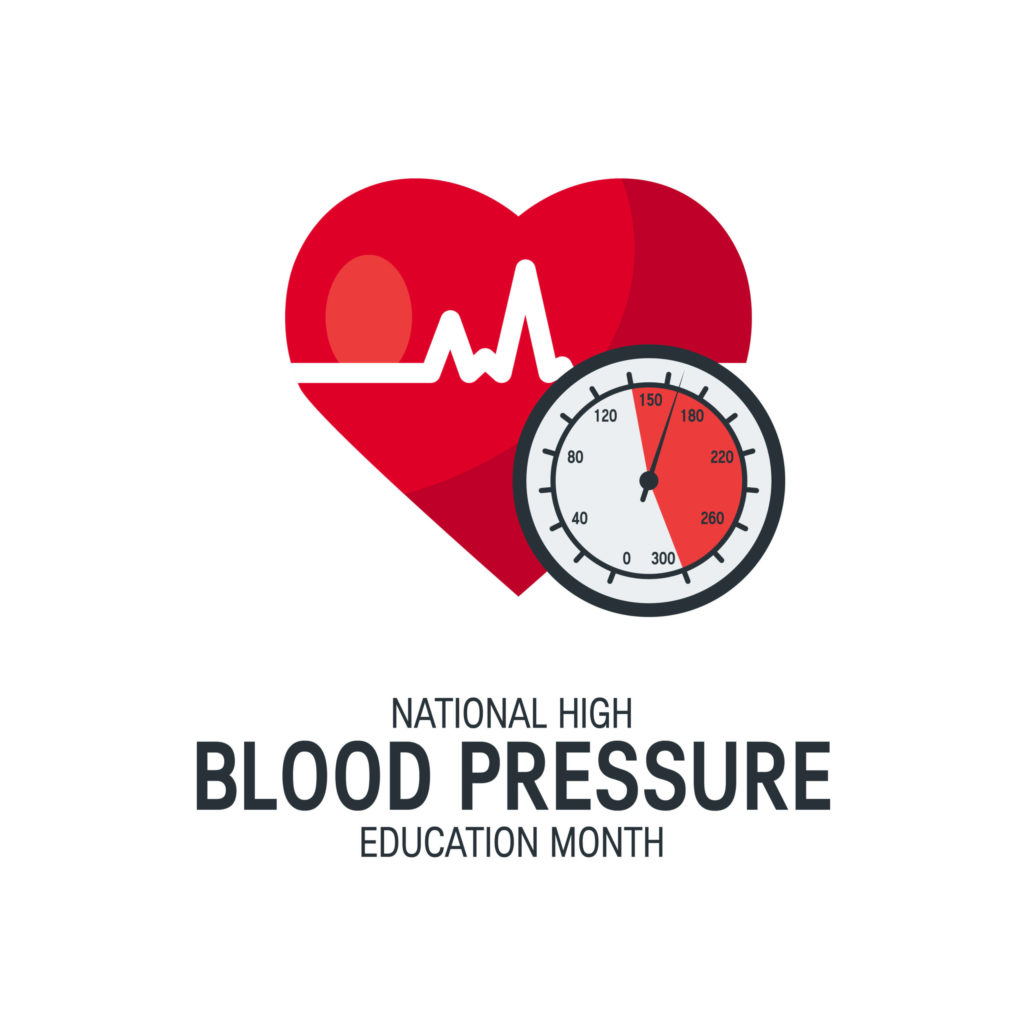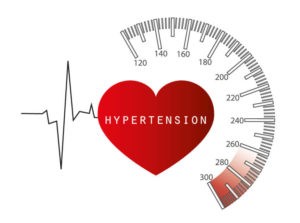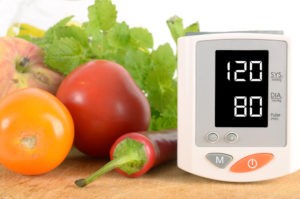May Is National High Blood Pressure Education Month: Taking Steps To Control Hypertension

May is National High Blood Pressure Education Month which raises awareness about the impact of hypertension. This month encourages the public to get their blood pressure checked, as well as take the necessary steps to lower it if it is high.
National High Blood Pressure Education Month is also used as a way to educate ourselves and learn about food and lifestyle choices that help you maintain a normal blood pressure reading. According to the Centers for Disease Control and Prevention (CDC), “In the United States, nearly one in three adults has hypertension, but only about half (47%) of those have it under control.”
At NJdiet, we are taking the opportunity during National High Blood Pressure Education
Month to provide you with valuable information on how to take charge of your health and encourage overall wellness. We will also be taking a look at invaluable tips on how high blood pressure can be prevented, and the diet and lifestyle changes that work to control it!
What Is Hypertension
Hypertension is another word for high blood pressure, and blood pressure is the force of blood against artery walls. If the blood pushes against the arteries too hard for too long, serious health problems can develop. In fact, high blood pressure is often called “the silent killer” because it has no symptoms but can seriously damage your brain, heart, and kidneys. The CDC revealed that “Each day in the United States, nearly 1,000 deaths are associated with hypertension.” Moreover, roughly 67 million Americans already have high blood pressure.
The following items can all contribute to high blood pressure:
- smoking
- being overweight
- having a high salt diet
- too much alcohol consumption
- stress
- genetics/family history
- chronic kidney disease
- thyroid disorders
As noted above, most people with high blood pressure don’t have any symptoms, such as sweating or headaches. Because many people feel fine, they don’t think they need to get their blood pressure checked. Even if you feel normal, your health may be at risk. Talk to your doctor about your risk for high blood pressure. The good news is that hypertension is controllable!
High Blood Pressure Facts
High blood pressure usually has no symptoms, but it can cause serious problems such as stroke, heart failure, heart attack and kidney failure. You can control high blood pressure through healthy lifestyle habits and taking medicines, as recommended by your doctor.
To find out your blood pressure, all you need is a blood pressure test done at your doctor’s office. Systolic pressure (the higher number) is the force on the blood vessel walls when the heart beats and pumps blood out of the heart. Diastolic pressure (the lower number) is the force that occurs when the heart relaxes in between beats. Criteria for understanding your blood pressure reading is as follows:
Systolic Blood Pressure (Top Number)
- Less than 120: Normal
- 120-139: Prehypertension
- 140-159: Stage 1 High Blood Pressure
- 160 or More: Stage 2 High Blood Pressure
Diastolic Blood Pressure (Bottom Number)
- Less than 80: Normal
- 80-89: Prehypertension
- 90-99: Stage 1 High Blood Pressure
- 100 or More: Stage 2 High Blood Pressure
Lifestyle Changes To Control Your Blood Pressure
There are a number of medications which can be prescribed for high blood pressure, but it’s important to incorporate healthier habits into your daily routine.
By living a healthy lifestyle, you can help keep your blood pressure in a healthy range and lower your risk for heart disease and stroke. A healthy lifestyle includes:
- Eating a healthy diet
- Reduce stress
- Maintaining a healthy weight
- Getting enough physical activity
- Reduce your caffeine intake
- Not smoking
- Limiting alcohol use
NJdiet uses personalized genetic testing to assess each
individual’s specific needs for essential vitamins, plus many more metabolic factors are assessed genetically to make sure you stay healthy for years to come. Some other tips for keeping your blood pressure in a normal range through lifestyle changes are as follows:
1. Skip Sodium
Take action to prevent high blood pressure by reducing sodium (salt) intake. Most Americans consume too much sodium, and it raises blood pressure in most people. A simple way to reduce the salt in your diet by cutting back on frozen, canned, and restaurant foods, which are huge sources of sodium. Also by checking the Nutrition Facts panel on the foods you buy, you can choose options with less salt.
- Choose Fresh, Unprocessed Foods: Fresh, unprocessed foods typically contain very little sodium. Stock up on seasonal fresh fruits and vegetables.
- Skip Added Sodium: Lots of sodium lurks in canned and frozen foods. Look for varieties with a “No Salt Added” label and be sure to check the Daily Value (DV) for sodium on the Nutrition Facts label.
- Incorporate Grains: According to the Center for Disease Control, “36.9% of average sodium consumed came from grains, and these included highly processed foods like bread, frozen meals, and soups.” Choose whole grains that you can cook yourself, like rice and oatmeal.
- Cook at Home: A great way to go low-sodium is to do most of your cooking at home. That way you can determine exactly how much salt is going into your meal. Check the nutrition information for all your ingredients before you begin, which can ensure that your meal is low-sodium.
The Dietary Guidelines for Americans advises people to “Reduce daily sodium intake to less than 2,300 milligrams (mg) and further reduce intake to 1,500 mg among persons who are 51 and older and those of any age who are African American or have hypertension, diabetes, or chronic kidney disease.”
2. Eat More Fruits and Vegetables
Replacing sodium-rich foods with fresh fruits and vegetables isn’t the only way you can use them to reduce your risk of hypertension. In fact, eating a healthy diet that is high in fruits and vegetables and low in sodium, saturated fats, trans fat, and cholesterol can help reduce the risk of high blood pressure.
Fruits and vegetables are loaded with healthful nutrients that reduce the risk of chronic disease, help with weight control, and even manage blood sugar. In addition, fruit and vegetable consumption, including potassium, and vitamin C, is associated with a significantly lower risk of hypertension. Making these simple changes to your diet can make a huge difference in your blood pressure!
3. Keep Active
Physical activity can help you maintain a healthy weight and lower your blood pressure. For adults, it is recommended to engage in 2 hours and 30 minutes of moderate-intensity exercise, like brisk walking or bicycling, every week. Children and adolescents should get 1 hour of physical activity every day.
Being physically active can help you reduce your risk of hypertension in two ways — by directly helping lower your blood pressure, and by helping you manage your weight, which is another high blood pressure risk factor. According to the National Heart, Lung, and Blood Institute, “being active and maintaining a healthy weight also can help you prevent high blood pressure.”
As you can see, during National High Blood Pressure Education Month the goal is to educate ourselves, as well as talk about the dangers of high blood pressure. By posting about this month’s public health and awareness campaign, you can help in reaching its goals.
The National Heart, Lung, and Blood Institute (NHLBI) is challenging Americans to participate in a national pledge to #MoveWithHeart to help reduce their risk of high blood pressure (hypertension). NHLBI is asking you to pledge by posting a photo or uploading a video of yourself doing being physically active and using the hashtag #MoveWithHeart!
NJdiet is a proven weight loss program that can be a big step in a patient’s road to a healthy
life
. NJdiet utilizes DNA testing to determine your ideal
diet and workout plan. Using blood work, hair and saliva sample, patients typically lose 20-50 pounds in only 40 days.
When you decide to change your life by attending the Initial Evaluation and Consultation at NJdiet, we will explain how our unique individualized system works to
reduce hunger and feel healthier. We will explain how many metabolic factors are assessed to genetically make sure you not only lose the weight, but ensures you keep it off and stay healthy for a lifetime.
Attending the Initial Evaluation and Consultation is normally $99, but by registering on our website it will only cost $27!
We welcome the opportunity for you to have a consultation with us, so register online now!
We welcome the opportunity to meet with you at NJdiet. Our
program is not only aimed at promoting healthy weight loss, but aims to improve your total wellness — where the side effect is weight loss, but the end result is better overall health and well being!





